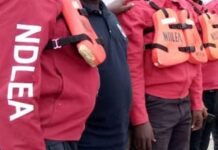
By Collins Yakubu-Hammer
Hajiya Sadiya Umar Farouq, Minister of Humanitarian Affairs, Disaster Management and Social Development has inaugurated Strategic Technical Working Group to enhance effective dissemination of information on humanitarian activities in Nigeria.
Farouq inaugurated the Group at a 3-Day Communications Strategy Technical Working Group Retreat on Monday in Abuja.
The News Agency of Nigeria (NAN) reports that the members of the group comprises heads of media and publicity from the nine agencies under the Ministry of Communication, experts from UN and the academia.
Farouq stressed that the roles of the ministry’s communications, media and press teams, and that of the stakeholders and relevant partners were interrelated and interdependent.
“This underscores the need for them to work together in developing a strategy that cuts across board and works for all, whether state or non-state actors.
“Furthermore, establishing inter-governmental and inter agency communications networks and collaborations will encourage cohesion and improve the overall effectiveness of humanitarian interventions.
“In the three years of its existence, the ministry has put in place humanitarian policies to guide humanitarian response and provide an enabling environment for the effective coordination of National and international humanitarian interventions.
“Humanitarian crisis, disasters and social issues are complex in nature and communicating such complexities has become increasingly difficult.
“So also, communicating these complexities to multiple players and the general public requires the adoption of a coherent, cohesive and coordinated approach,” Farouq said.
She further explained that the approach required communication solutions that provided information, advisories and guidance across broad range of issues to all groups, partners, stakeholders, people of concern and public.
According to Farouq, the Communication Strategy to be developed is not intended to duplicate or replace any Partner/Stakeholders existing communication, media or advocacy activities or tamper with their brand identity.
“Rather it will identify strategic ways that joint communications can help to achieve their vision and the community achieve their collective vision and goals.
“The Strategy must speak to the peculiarities and nature of the assignment of all those involved in humanitarian response.
NAN reports that Farouq was represented at the event by the Permanent Secretary of the ministry, Dr Nasir Sani-Gwarzo.
Speaking, the Special Assistant to Farouq on Corporate Communications, Mrs Halima Oyelade, said the essence of the retreat was to have a document and structure for synergy and effective media engagement that could also solidify sustainability.
Similarly, Dr Oluseyi Soremekun, the National Information Officer, NU Information Centre, Nigeria, said when an organisation was doing a lot, but not communicating enough, its effort would not be appreciated.
He added that the timing and inauguration of the group was apt.
Also, Dr Bala Muhammed, a lecturer at the Bayero University, Kano said expertise was not effectiveness, adding that there was a need to have strategic system of communication that would be purposeful and effective.
“There is a communication and Information Policy, but there is no policy on how we communicate what we do. I hope that God will see us through and I also hope that our efforts here will not meet the bureaucratic bottleneck of governance.” (NAN)



